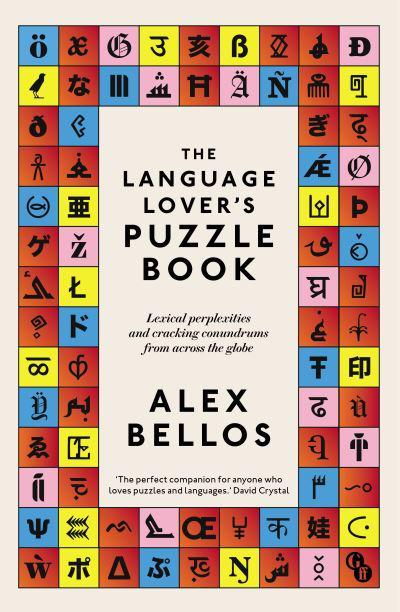
If you’re a fan of maths (which we assume you are, if you’re reading a maths blog), you might be familiar with Alex Bellos from his excellent popular maths books, including Alex’s Adventures in Numberland and the follow-up Alex Through The Looking Glass; you might also enjoy his more recent forays into puzzle books, including Can You Solve My Problems, and Japanese logic puzzle collection Puzzle Ninja, as well as his regular Monday puzzle column in The Guardian.
For his latest book, The Language Lover’s Puzzle Book, Alex has focused on language puzzles, largely drawn from the linguistic equivalent of Maths Olympiads (which he’s gotten really into lately). It’s a hefty volume split into cleverly collected sections on different aspects of language – including how languages are constructed, how words are pronounced, and as you might expect, the origins of how language is used to communicate numbers.
The book contains 100 puzzles, which cover a range of types – often starting by giving some examples of how something works, then a few more for you to figure out. There’s always a clue there, and the puzzles involve dozens of real languages – spoken, historical and even some invented ones. I’d imagine if you actually speak any of the languages featured, it’d make some of the puzzles somewhat trivial, but otherwise they’re well-pitched, and you can’t help but learn interesting facts about the world and the history of language as you go along.
Even though the book isn’t a book of maths puzzles, it still manages to be pretty mathematical – you can sense Alex’s mathematical way of thinking in the choice of puzzles, and some of the puzzles even have a neat underlying mathematical structure to them. One chapter deals with interesting linguistic edge cases and idiosyncrasies: a favourite hobby of mathematicians; and throughout the book, almost all the puzzles involve looking for patterns and making logical inferences.
Despite being ostensibly about language, the variety of topics covered in the book is astonishing – from family trees to descriptions of heraldic flags, the puzzles cover all aspects of the way humans use language to describe and interact with the world around us. If you or someone you know is curious and interested in how things fit together, whether into languages or logic or neither or both, this book would be a great investment.
The Language Lover’s Puzzle Book: Lexical perplexities and cracking conundrums from across the globe by Alex Bellos, on Hive
One Response to “Alex Bellos – The Language Lover’s Puzzle Book”